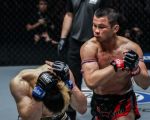Muay Thai Diet for Fighters: Fuel Your Performance and Strength
- 1. Understanding the Importance of Diet for Muay Thai Fighters
- 2. Nutritional Needs for Muay Thai Fighters
- 3. Best Meal Plans for Muay Thai Fighters
- 4. Pre-Fight Nutrition: What to Eat Before a Fight
- 5. Post-Fight Nutrition: Recovering After a Fight
- 6. Supplements for Muay Thai Fighters: What to Consider
- 7. Conclusion: Optimize Your Muay Thai Performance with the Right Diet
1. Understanding the Importance of Diet for Muay Thai Fighters
Muay Thai is an intense, high-energy sport that demands a lot from the body. From the explosive power required to deliver powerful strikes to the endurance needed to last through rounds of heavy sparring, Muay Thai fighters need to ensure their bodies are well-nourished and properly fueled. A well-balanced diet for Muay Thai fighters can be the difference between winning and losing in the ring.
While training is essential, it’s important to remember that what you eat plays a pivotal role in your ability to perform. The right foods can help you build strength, recover from intense training, and maintain optimal performance levels. In this article, we’ll explore the essential elements of a Muay Thai diet, providing you with a guide to fueling your body for the best results in the gym and during fights.
2. Nutritional Needs for Muay Thai Fighters
Muay Thai fighters require a diet that supports high-intensity training, endurance, and muscle recovery. Proper nutrition should focus on providing a balance of macronutrients, vitamins, and minerals to optimize performance. Here's a breakdown of what to include in a Muay Thai fighter's diet:
- Carbohydrates: Carbs are the primary source of energy for fighters. Consuming complex carbohydrates such as brown rice, whole grains, and sweet potatoes provides long-lasting energy, especially for endurance training and sparring sessions.
- Protein: Protein is essential for muscle recovery and repair. Fighters should aim to consume lean protein sources like chicken, fish, eggs, and plant-based proteins to build and maintain muscle mass.
- Healthy Fats: Healthy fats, like those found in avocados, nuts, seeds, and olive oil, provide sustained energy and support overall health. These fats are especially important for fighters who need to stay lean without sacrificing strength.
- Hydration: Staying hydrated is crucial for maintaining energy levels and preventing fatigue during long training sessions. Water and electrolyte-rich drinks should be consumed consistently throughout the day to stay properly hydrated.
Balancing these nutritional elements is essential for maintaining strength, improving endurance, and recovering quickly after intense training or fights.
3. Best Meal Plans for Muay Thai Fighters
Meal planning is an important aspect of any fighter’s training regime. Having a structured meal plan ensures that you are fueling your body with the right nutrients at the right times. Here's a general guide to the best meal plans for Muay Thai fighters:
- Breakfast: A high-protein breakfast with complex carbohydrates sets the tone for the day. Consider options like scrambled eggs with spinach and whole-grain toast or a smoothie with protein powder, oats, and fruits.
- Pre-Workout Meal: About 60-90 minutes before training, opt for a light meal that includes both carbs and protein. A good option is a banana with almond butter or a small bowl of oatmeal with some nuts and honey.
- Post-Workout Meal: After a hard training session, focus on protein and carbs to replenish glycogen stores and aid muscle recovery. Grilled chicken with quinoa and vegetables, or a protein shake with a piece of fruit, is an excellent post-workout meal.
- Dinner: A balanced dinner with lean protein, healthy fats, and complex carbs will help support recovery. A salmon fillet with roasted sweet potatoes and a side of greens is a great choice.
Consistently following a well-balanced meal plan that caters to your energy demands will help you maintain focus, strength, and overall health as you train and prepare for competition.
4. Pre-Fight Nutrition: What to Eat Before a Fight
What you eat before a fight can significantly impact your performance in the ring. Your body needs enough energy to perform at its best, without feeling sluggish or too full. A good pre-fight meal should include easily digestible foods that provide a quick source of energy and support stamina throughout the match. Aim to eat your pre-fight meal about 2-3 hours before your fight to give your body time to digest the food.
Some recommended pre-fight foods include:
- Bananas: A great source of natural sugars and potassium, which helps prevent cramping.
- Oatmeal with honey: A slow-digesting carbohydrate that provides steady energy without spiking blood sugar levels.
- Lean chicken with rice: A light yet protein-packed meal that provides long-lasting energy for endurance during the fight.
Avoid heavy, greasy, or overly spicy foods that can make you feel sluggish or upset your stomach during the fight.
5. Post-Fight Nutrition: Recovering After a Fight
After a fight, recovery is just as important as the preparation leading up to it. Proper post-fight nutrition helps replenish glycogen stores, repair muscles, and rehydrate the body. The focus should be on getting the right nutrients in the right amounts as soon as possible after the fight.
Here’s what you should eat after a fight:
- Protein: Protein is essential for muscle repair and recovery. A post-fight meal should include a protein-rich food like chicken, fish, or tofu.
- Carbs: Replenishing glycogen stores is critical for recovery. Consume complex carbohydrates like sweet potatoes, brown rice, or whole-grain pasta to restore energy levels.
- Hydration: It’s essential to rehydrate after a fight to replace lost fluids. Drink water or an electrolyte-rich drink to restore your body’s hydration levels.
A well-balanced post-fight meal will ensure that your body recovers quickly, reducing soreness and fatigue so you can get back to training sooner.
6. Supplements for Muay Thai Fighters: What to Consider
While a balanced diet should be your primary source of nutrition, supplements can play a role in optimizing performance and recovery. Here are some popular supplements that many Muay Thai fighters use:
- Protein Powder: A quick and convenient way to meet your protein needs, especially post-workout when your body requires protein to repair muscles.
- Creatine: Creatine helps improve strength and endurance by providing extra energy for short bursts of intense activity, which is especially useful in Muay Thai.
- Branched-Chain Amino Acids (BCAAs): BCAAs can reduce muscle soreness and promote faster recovery after intense training sessions.
- Fish Oil: Omega-3 fatty acids in fish oil help reduce inflammation, promote heart health, and support joint function, all important for athletes.
Consulting with a healthcare professional or a sports nutritionist can help you choose the right supplements to enhance your Muay Thai training and performance.
7. Conclusion: Optimize Your Muay Thai Performance with the Right Diet
Having the right Muay Thai diet for fighters is crucial for improving strength, stamina, and overall performance in the ring. By focusing on a balanced diet that includes proper macronutrients, pre- and post-fight meals, and strategic use of supplements, you can ensure that your body has the fuel it needs to perform at its best. Don’t forget that consistency is key—whether you're training or recovering, sticking to your nutritional plan will help you stay on top of your game.
If you're serious about optimizing your Muay Thai performance, check out the expert nutrition advice and training products available at Humble Challenger. Get the right tools and guidance to take your Muay Thai skills to the next level!

































